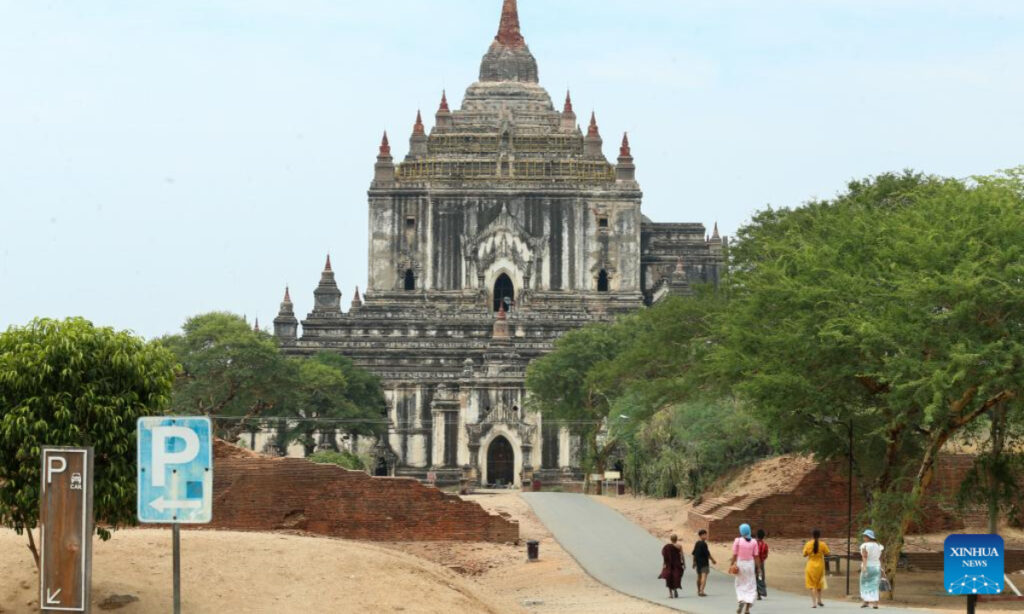Though a slew of efforts have made to win back foreign tourists, Myanmar has been spurned due to rising security concerns caused by high profile telecom fraud cases and domestic political turmoil. Bookings for five-star hotels in the country still have been desolate even though the prices of some rooms have dropped to 300 yuan ($40) per night, Chinese media reported.
Some starred hotels in Myanmar have even been forced to give 40 percent discounts to lure in tourists. Earlier this year, the famous Sedona Hotel Yangon was forced to sell to a Singaporean company and a $130 million Peninsula hotel project in Yangon was suspended due to political instability and other factors, media reports said.
When reached by the Global Times on Thursday, several travel agencies, including Beijing China International Travel Service Co, Shanghai China International Travel Service Co, Spring Tour, tuniu.com and Shanghai Airlines Tours International, replied that they have no tourism products for Myanmar on offer at the moment.
They were uncertain about when these tours would resume. A staffer from tuniu.com told the Global Times that they can only provide business visa services at the moment.
According to a notice issued by the General Office of China’s Ministry of Culture and Tourism on August 10, travel agencies and online tourism service providers across the country have been permitted to resume outbound group tours and “airline tickets plus hotel” services for Chinese citizens to destinations listed in the third batch of permitted countries and regions. Myanmar is included on the list of Asian countries.
It is no longer surprising to see Chinese people say they are worried about being caught in telecom scams due to stereotypes involving Myanmar. The unfavorable perceptions about the South Asian nation were once again reinforced by No More Bets, a crime action drama currently dominating the box office in the Chinese mainland.
In a poll conducted by Chinese media on Thursday inquiring about whether Chinese netizens would travel to Myanmar, 8,901 respondents out of 9,298 said they wouldn’t consider going due to safety concerns.
Chinese tourists’ unfavorable perception toward Myanmar is a result of multiple factors – political turmoil, rising concerns over rampant telecom fraud cases and the relatively poor tourism reception capability comparing to other South Asian countries, Song Qingrun, a senior research fellow from the School of Asian Studies at Beijing Foreign Studies University, told the Global Times on Thursday. Limited direct flights could also be one of the reasons why there hasn’t been a jump in the number of Chinese tourists traveling to the country, Song noted.
Myanmar’s political society has been continually torn apart in the past few years. The struggle between the military and its supporters and the opposition has turned violent. Some extremist rebels have formed shadow governments along the border, carrying out scattered violent attacks on government departments and military and political officials, Song noted.
The Chinese Embassy in Myanmar frequently reminds Chinese citizens not to believe high-salary recruitment information online, engage in illegal or criminal activities, so as to avoid damage to life and property during their stay in Myanmar. Previously, the UK warned British citizens not to travel to the conflict zone in Myanmar and the US State Department has also issued a Level 4 advisory against travel to the country, quoting civil unrest and armed conflicts.
According to figures from the Myanmar’s Ministry of Hotels and Tourism, from April 2022 to the end of March in 2023, Myanmar received a total of 367,368 international tourists, of which Chinese tourists topped the list at 48,342, accounting for 13.15 percent. This is not even a fraction of what it used to be.
The latest data during the first half of 2023 showed that Myanmar attracted just 450,000 foreign tourists, led by Chinese and Thai tourists. Although it saw an increase compared to the same period last year, that increase is far less than that of neighboring countries, media reported.
Song told the Global Times that the peak influx of Chinese travelers to the South Asian country in 2016 and 2017 has not returned despite the resumption of China’s group tours to the country. However, Song said that since Myanmar is a close neighboring country of China and contains vast abundant tourism resources, it is still attractive to many Chinese travelers. He also called for a rational view of the country since the stereotype that it is plagued by crimes may have been amplified by media.
Myanmar has been making efforts to optimize its domestic tourists market. Myanmar’s ambition to win back more Chinese tourists can clearly be seen at the ongoing seventh China-South Asia Expo in Kunming, Southwest China’s Yunnan Province, Song said.
Myanmar has arranged for more than 100 entrepreneurs to participate in the exhibition and for the first time used naked eye 3D screens to display the beautiful cultural scenes of the country, the China News Service has reported.
Some tourism insiders pointed out that the gloomy tourism enthusiasm from Chinese people in the post COVID-19 era does not specially target the country, but the entire South Asian tourism market. An employee surnamed Sun from Shanghai Airlines Tours International told the Global Times that tours to Southeast Asian countries have all shown average poor performances these days except for the Philippines.
(Global Times)



